




Does your washing machine leave behind an annoying residue on your clothes? You’re not alone. This common problem can be frustrating and lead to a lot of wasted time and frustration. But don’t worry, there are solutions to help you tackle this issue head-on.
One possible reason for the gunk on your clothes is a buildup of detergent or fabric softener in your washing machine. Over time, these substances can accumulate inside the machine and transfer onto your clothes during the wash cycle. This residue can make your clothes look dull and feel sticky, defeating the purpose of washing them in the first place.
Another potential culprit is hard water. If you live in an area with hard water, mineral deposits can build up in your washing machine and leave behind a white, chalky residue on your clothes. This can be especially frustrating because it’s difficult to remove and can make your clothes look dirty even after they’ve been washed.
Luckily, there are steps you can take to solve these issues. Regularly cleaning your washing machine can help remove built-up detergent and fabric softener, preventing them from transferring onto your clothes. Additionally, using a descaling agent or vinegar in your washing machine can help break down mineral deposits and prevent the white residue from appearing on your clothes.
So, if you’re tired of finding gunk on your clothes after every wash, don’t despair. With a little bit of knowledge and proactive cleaning, you can ensure that your washing machine leaves your clothes looking and feeling fresh and clean every time.
Possible Reasons for Gunk on Clothes
If your washing machine is leaving gunk on your clothes, it can be very frustrating. Here are some possible reasons why this might be happening:
- Detergent buildup: Over time, detergent can accumulate in your washing machine and form a slimy residue. This residue can then transfer onto your clothes, leaving behind gunk. It is important to regularly clean your washing machine to prevent this buildup.
- Lack of proper cleaning: Inadequate cleaning of your washing machine can lead to the accumulation of dirt, lint, and other particles. These particles can mix with the water and detergent, forming gunk that ends up on your clothes. Regular cleaning of your washing machine’s drum, filters, and other parts can help prevent this issue.
- Hard water: Hard water contains high levels of minerals, such as calcium and magnesium. When hard water is used in the washing machine, these minerals can react with detergents and form a layer of residue. This residue can then transfer onto your clothes, leaving behind gunk. Using a water softener or adding a water conditioner can help minimize this problem.
- Incorrect detergent usage: Using too much or too little detergent can lead to gunk on clothes. Excessive detergent can leave behind a residue, while insufficient detergent may not effectively clean the clothes, allowing dirt and other particles to accumulate. It is important to follow the detergent manufacturer’s instructions for proper usage.
- Internal issues with the washing machine: Sometimes, internal issues with the washing machine can cause gunk to appear on clothes. These issues can include clogged drain pipes, malfunctioning water valves, or damaged seals. If you have ruled out other possible causes, it may be necessary to call a professional to inspect and repair your washing machine.
By identifying the possible reasons for gunk on clothes, you can take the necessary steps to prevent this issue and ensure that your clothes come out clean and gunk-free from your washing machine.
How to Clean Your Washing Machine
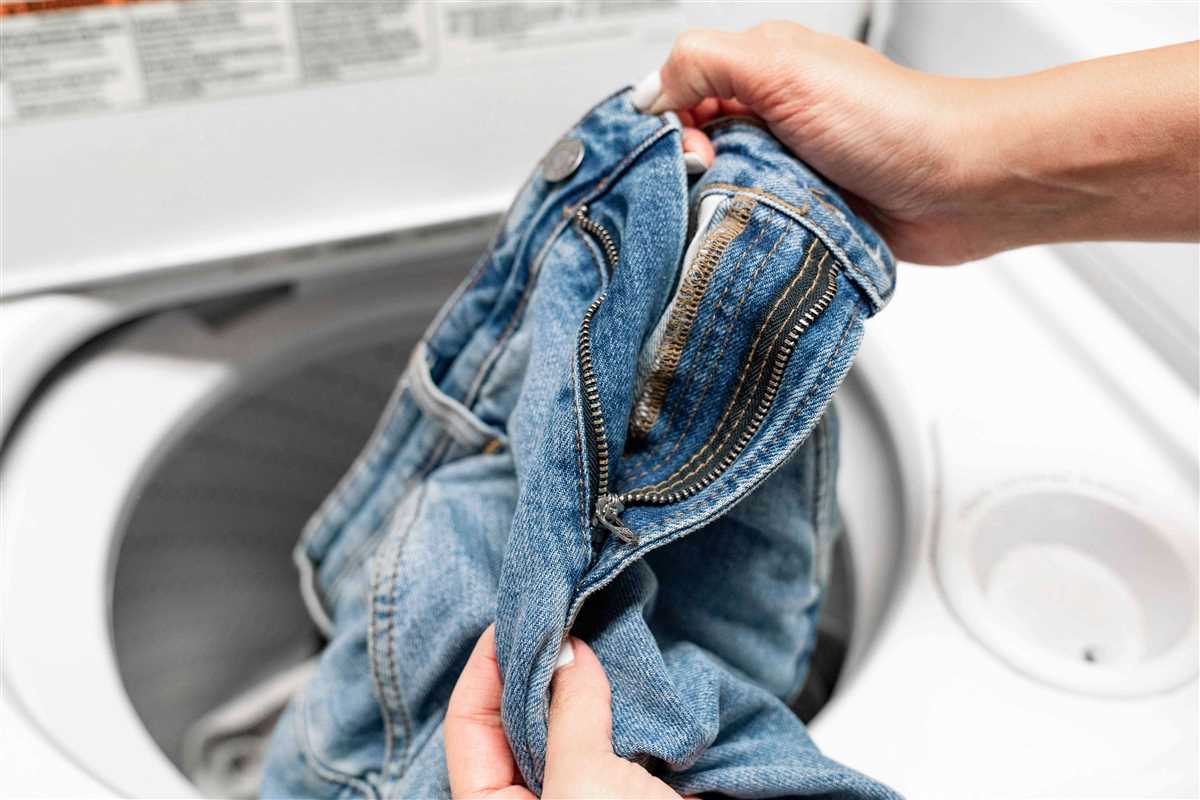
Keeping your washing machine clean is essential to prevent gunk from accumulating on your clothes. Here are some steps you can follow to ensure your washing machine stays in optimal condition:
1. Regularly clean the drum
Over time, debris, detergent residue, and fabric softener can build up inside the drum of your washing machine. To clean it, you can:
- Mix equal parts water and white vinegar.
- Pour the mixture into the detergent dispenser or directly into the drum.
- Run a hot water cycle on your machine without any clothes.
- Once the cycle is complete, wipe down the drum with a clean cloth or sponge.
2. Clean the detergent dispenser
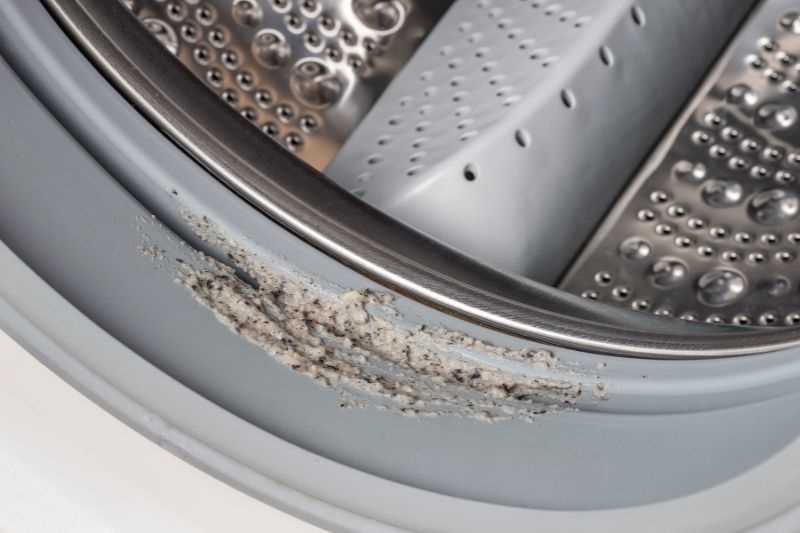
The detergent dispenser can also accumulate residue and gunk. To clean it:
- Remove the dispenser from the washing machine.
- Soak it in warm soapy water for a few minutes.
- Scrub it with a brush to remove any buildup.
- Rinse thoroughly and let it dry before reattaching it to the machine.
3. Check and clean the filter
Many washing machines have a filter that can get clogged with lint, hair, and other debris. To clean the filter:
- Locate the filter, which is usually at the bottom of the machine behind a small panel.
- Unscrew the filter cap and remove any debris.
- Thoroughly rinse the filter under running water to remove any remaining debris.
- Screw the filter cap back on tightly.
4. Run a maintenance wash
Running a maintenance wash regularly can help keep your washing machine clean and prevent buildup. To do a maintenance wash:
- Empty the drum of the machine.
- Add two cups of white vinegar to the detergent dispenser or directly into the drum.
- Run a hot water cycle on your machine.
- After the cycle is complete, wipe down the drum with a clean cloth or sponge.
5. Take preventative measures
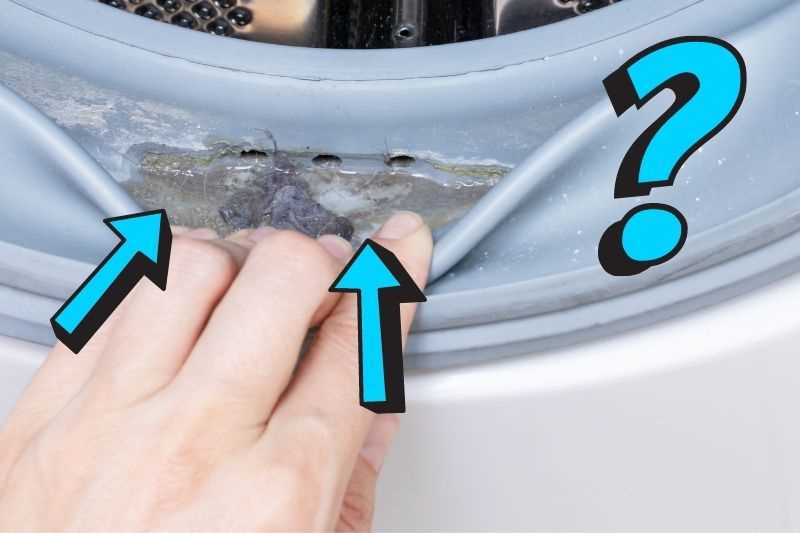
There are also some preventative measures you can take to keep your washing machine clean:
- Use the recommended amount of detergent and fabric softener.
- Don’t overload the machine with too many clothes.
- Leave the door or lid of the machine open after each use to let it air out and dry.
By following these steps and incorporating regular cleaning into your washing machine maintenance routine, you can ensure that your machine stays clean and your clothes come out gunk-free.
Using the Right Detergent
One common reason for your washing machine to leave gunk on your clothes is using the wrong detergent. Using the right detergent is crucial to ensure clean and residue-free laundry. Here are some tips on choosing the right detergent:
1. Read the Labels
When selecting a detergent, make sure to read the labels carefully. Look for detergents that are specifically formulated for your type of washing machine, such as top-loading or front-loading machines. These detergents are designed to work efficiently with your machine’s specific requirements.
Tip: Avoid using traditional powdered detergents in front-loading machines, as they can cause excessive sudsing and leave behind residue.
2. Choose High-quality Detergents
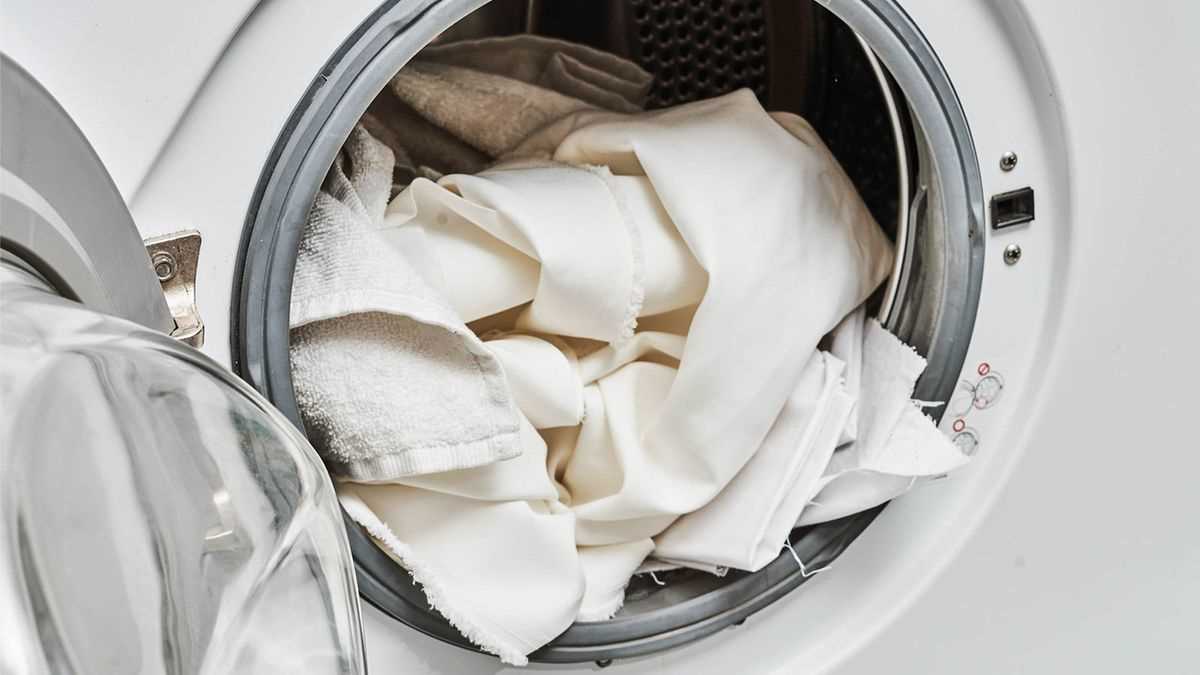
Investing in high-quality detergents can make a significant difference in the cleanliness of your clothes. Look for detergents that are formulated to remove tough stains and residues effectively. These detergents often have specific features, such as enzymes or optical brighteners, which help to enhance the cleaning power.
3. Avoid Overloading the Machine
Using too much detergent or overloading the machine can also contribute to the gunk left on your clothes. Follow the manufacturer’s instructions on the detergent packaging to determine the appropriate amount to use for each load. Overloading the machine can prevent the detergent from distributing evenly, leading to poor cleaning results and residue buildup.
4. Consider Water Hardness
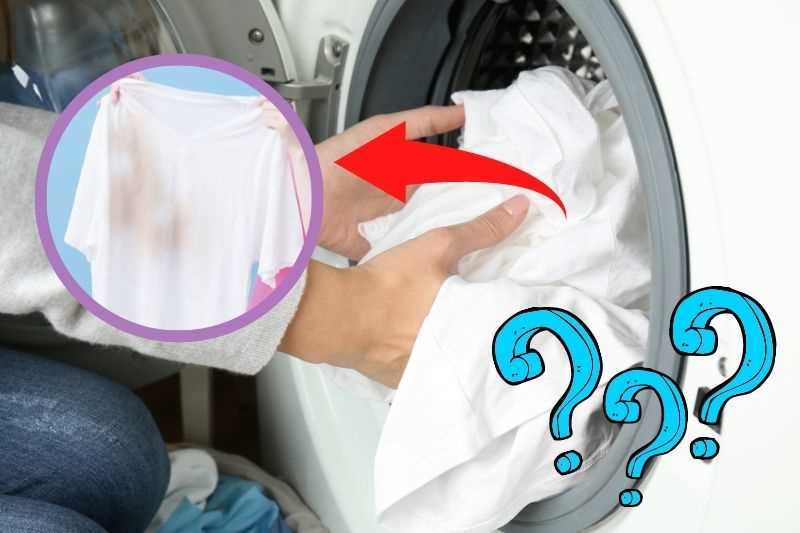
If your water supply is hard, it might be beneficial to use a detergent specifically formulated for hard water conditions. Hard water can reduce the effectiveness of certain detergents, leaving behind mineral deposits on your clothes. Look for detergents that are designed to work well with hard water and provide effective cleaning results.
Tip: You can test the hardness of your water by using a water hardness testing kit, or by contacting your local water utility for information.
5. Regular Maintenance
Periodically cleaning your washing machine can also help prevent gunk buildup. Follow the manufacturer’s instructions for cleaning and maintaining your machine. This can involve running an empty cycle with hot water and vinegar or using washing machine cleaning tablets to remove any residue or buildup.
Note: It’s recommended to check and clean the machine’s filter regularly, as a clogged filter can contribute to poor washing results and the accumulation of residue on clothes.
By using the right detergent and following these tips, you can help prevent gunk from being left on your clothes and ensure cleaner, fresher laundry.
Preventing Gunk Build-Up

Preventing gunk build-up in your washing machine is essential to ensure clean and fresh clothes after every wash. Here are some tips to help you prevent gunk build-up:
- Use the right detergent: Using the right detergent for your washing machine is crucial. Make sure to read the manufacturer’s instructions on the type and amount of detergent to use. Using too much detergent can lead to excessive suds and gunk build-up.
- Choose the appropriate wash cycle: Different fabrics and levels of dirtiness require different wash cycles. Selecting the appropriate wash cycle for your laundry not only helps in effective cleaning but also prevents gunk build-up. Use the delicate cycle for delicate fabrics and the heavy-duty cycle for heavily soiled items.
- Do regular cleaning maintenance: It’s important to clean your washing machine regularly to prevent gunk build-up. Wipe down the drum, gasket, and detergent dispenser after each use. Additionally, run a cleaning cycle with a washing machine cleaner at least once a month to remove any accumulated residues.
- Avoid overloading the machine: Overloading your washing machine can lead to poor cleaning performance and gunk build-up. Follow the manufacturer’s guidelines on load capacity and avoid stuffing too many clothes into the machine.
- Inspect and clean the filter: Many washing machines have a filter that traps lint, hair, and other debris. Regularly inspect and clean the filter to prevent these particles from accumulating and causing gunk build-up.
- Avoid leaving wet laundry in the machine: Leaving wet laundry in the washing machine for extended periods can create a damp environment that promotes the growth of mold and mildew. Remove your clothes promptly after each wash to prevent gunk build-up.
By following these tips, you can significantly reduce the chances of gunk build-up in your washing machine, ensuring cleaner and fresher clothes every time you do your laundry.
Professional Help for Persistent Gunk Issues
If you’ve tried all the DIY solutions and are still experiencing gunk issues with your washing machine, it may be time to seek professional help. Professional technicians have the knowledge and expertise to diagnose and fix the problem effectively.
Here are a few reasons why you should consider hiring a professional:
- Specialized Equipment: Professional technicians have access to specialized tools and equipment that can help them identify and resolve gunk issues that may not be easily detectable.
- Experience: Professionals have years of experience dealing with various washing machine problems, including persistent gunk issues. They know the most effective techniques and solutions to address these issues.
- Preventing Further Damage: If gunk is left untreated for a long time, it can cause damage to your washing machine’s components. Professional help can prevent further damage and potentially save you from costly repairs or replacements.
- Warranty Coverage: If your washing machine is still under warranty, attempting to fix the gunk issues yourself may void the warranty. Hiring a professional ensures that you don’t lose your warranty coverage.
When hiring a professional, it’s important to choose a reputable and experienced technician. Look for companies or individuals that specialize in washing machine repairs and have positive customer reviews.
A professional technician will assess your washing machine, identify the root cause of the gunk issues, and recommend the most appropriate course of action. This may involve thorough cleaning, replacing faulty parts, or suggesting routine maintenance practices to prevent future gunk buildup.
Remember, seeking professional help can save you time, effort, and money in the long run. Don’t hesitate to reach out to a professional if your washing machine’s gunk issues persist after trying other solutions.
FAQ
Why is my washing machine leaving gunk on my clothes?
There could be a few reasons for this. One possible reason is that there is a buildup of detergent and fabric softener residue in your washing machine. Another reason could be that there is mold or mildew growth in your washing machine. It’s also possible that the water in your washing machine is not draining properly, causing it to deposit debris onto your clothes. Lastly, it could be an issue with the quality of your detergent or fabric softener.
How can I get rid of the gunk on my clothes?
There are a few things you can try. First, make sure to clean your washing machine regularly to remove any residue or mold. You can do this by running an empty cycle with hot water and a cup of white vinegar or bleach. Also, try reducing the amount of detergent and fabric softener you use, as excessive amounts can contribute to residue buildup. Additionally, check the water drainage in your machine and make sure it’s working properly. If the gunk persists, you may need to switch to a different detergent or contact a professional for further assistance.
Is it safe to use bleach to clean my washing machine?
Yes, it is generally safe to use bleach to clean your washing machine. However, you should be cautious and follow the manufacturer’s instructions. Use the recommended amount of bleach and avoid mixing it with other cleaning products, as this can create potentially harmful chemicals. Also, make sure to run an additional rinse cycle after cleaning with bleach to remove any remaining residue.
Can hard water cause gunk on clothes?
Yes, hard water can be a contributing factor to gunk on clothes. Hard water contains high levels of minerals, such as calcium and magnesium, which can react with detergents and create a residue. This residue can then deposit onto your clothes during the wash cycle. If you have hard water, using a water softener or a laundry detergent specifically designed for hard water can help prevent the buildup of gunk on your clothes.
What should I do if cleaning my washing machine doesn’t solve the problem?
If cleaning your washing machine doesn’t solve the issue, there are a few additional steps you can take. First, make sure you are using the correct amount and type of detergent for your machine. Using too much detergent or using the wrong type can contribute to residue buildup. You can also try using a laundry additive, such as borax or washing soda, to help break down the gunk on your clothes. If the problem persists, it may be worth contacting a professional to inspect and potentially repair your washing machine.
Why is my washing machine leaving gunk on clothes?
There can be several reasons why your washing machine is leaving gunk on clothes. One possibility is that there is a build-up of detergent residue or fabric softener in the machine. This can happen if you are using too much detergent or if you are not cleaning your machine regularly. Another reason could be that there is a problem with the machine’s filter or drain pump, which is causing debris to be trapped and then transferred onto your clothes during the wash cycle. Lastly, if you have hard water, mineral deposits can accumulate in the machine and eventually get on your clothes.
How can I prevent my washing machine from leaving gunk on clothes?
There are several steps you can take to prevent your washing machine from leaving gunk on clothes. Firstly, make sure you are using the correct amount of detergent for each load and consider using less fabric softener, as excess amounts can contribute to the problem. It is also important to regularly clean your machine, including the filter and drum, to remove any build-up of residue or debris. If you have hard water, you may want to consider using a water softener or descaler to prevent mineral deposits from forming. Lastly, if the issue persists, it might be worth having a professional inspect and service your machine to ensure there are no underlying mechanical problems.












